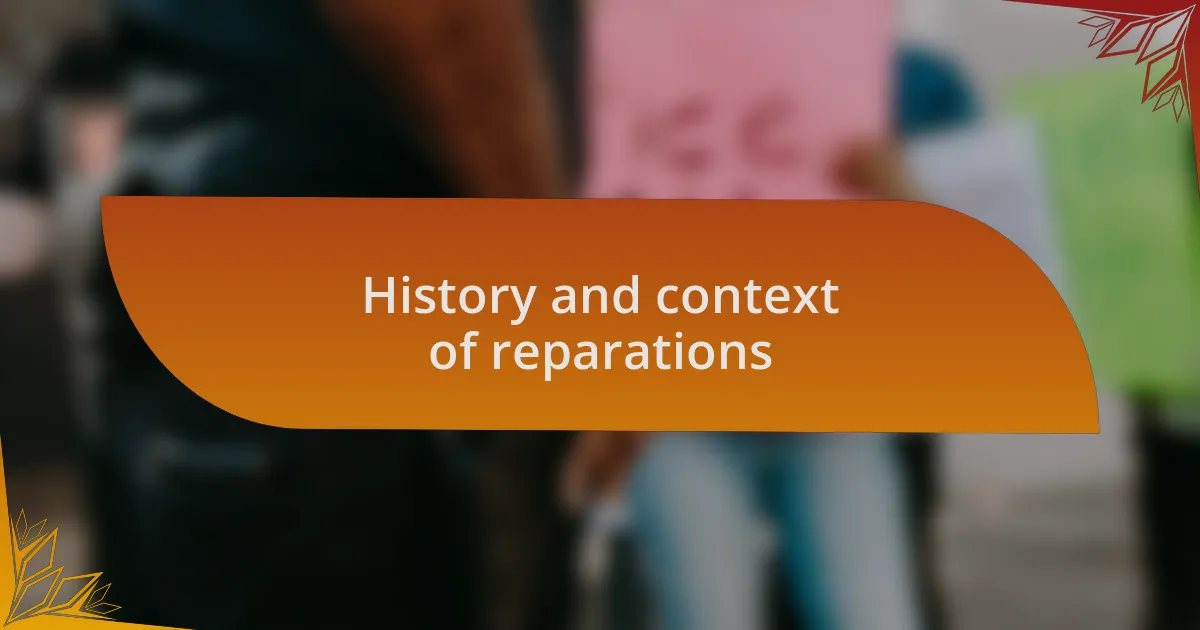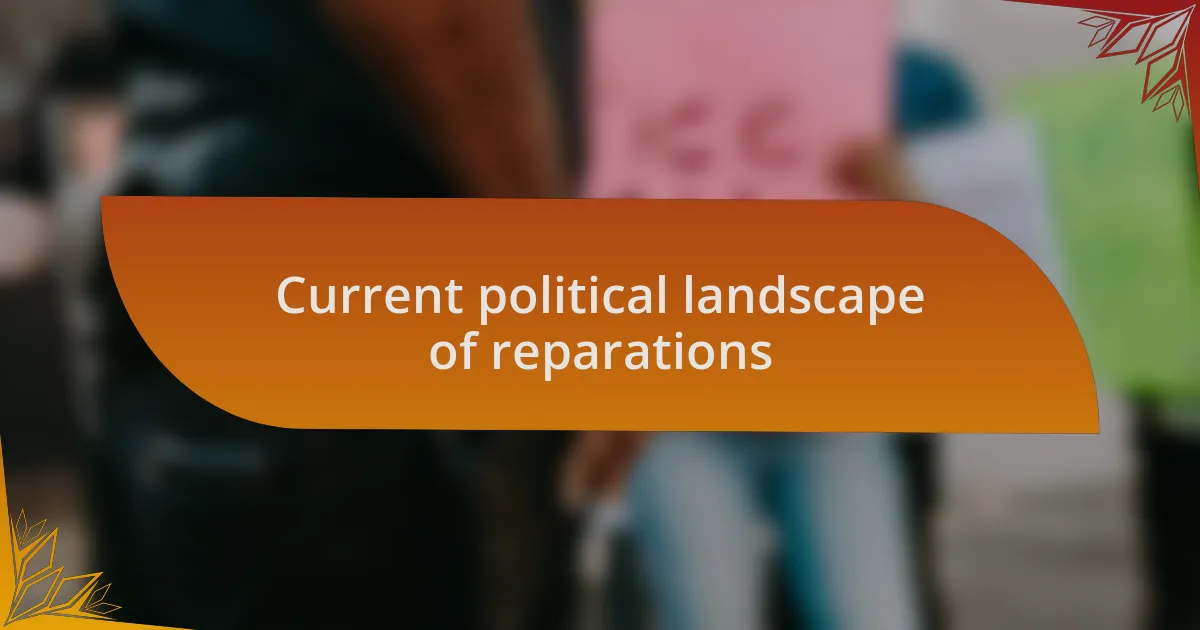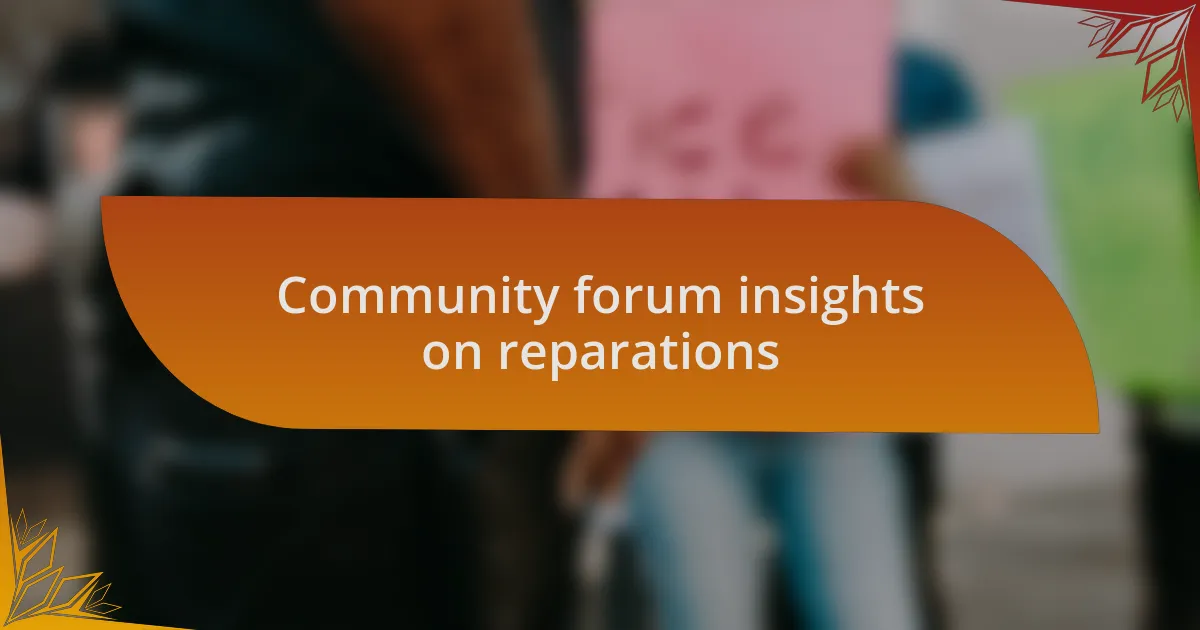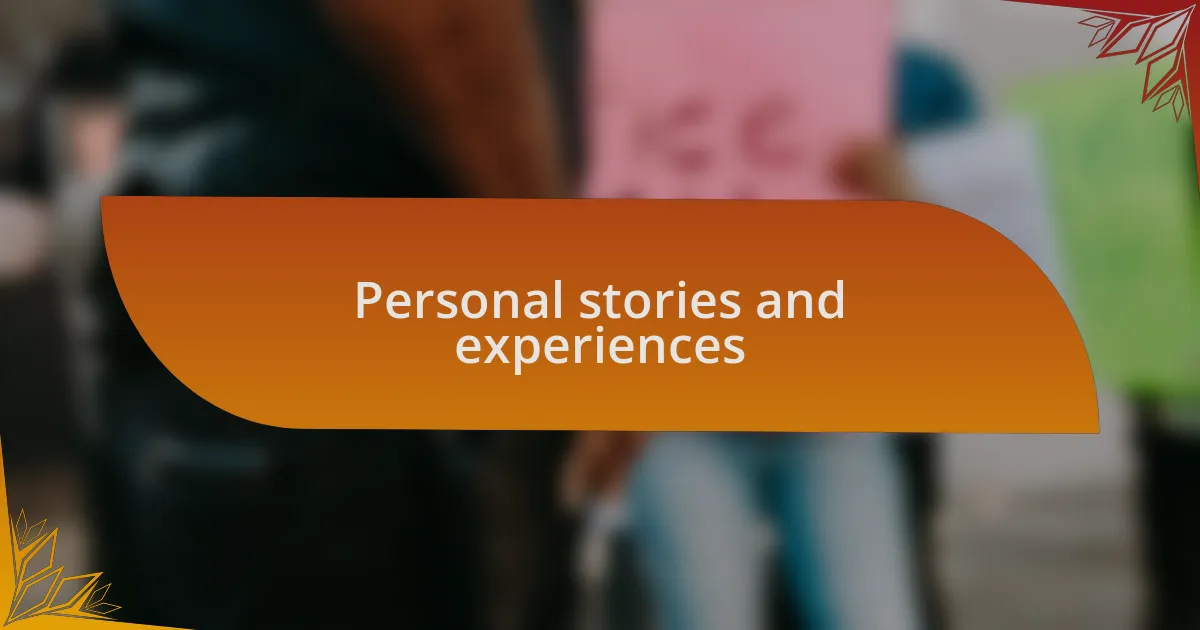Key takeaways:
- Reparations politics involves compensation for historical injustices and emphasizes emotional healing alongside financial restitution.
- The history of reparations can be traced back to post-Civil War promises, highlighting a legacy of unfulfilled commitments and ongoing grievances.
- Current debates around reparations are divisive, with some advocating for policy initiatives while others express skepticism about funding and implementation.
- Personal stories in community forums illustrate the deep emotional scars and ongoing impact of historical injustices, emphasizing the need for meaningful action beyond monetary compensation.

Reparations politics defined
Reparations politics is the collective discourse surrounding compensation for historical injustices, particularly regarding racial disparities and slavery. I often find myself reflecting on the weight of this conversation—how we navigate the complexities of acknowledging past wrongs while ensuring a just future. Isn’t it fascinating how the idea of reparations not only addresses financial compensation but also touches deeply on the emotional reparations needed for healing communities?
I recall my first encounter with the discussions on community forums, where individuals passionately advocated for reparations. Hearing their stories made me realize that it’s much more than a political agenda; it’s about restoring dignity and rectifying decades of systemic oppression. Can compensation ever truly equate to the pain suffered? Many argue it can’t, yet others believe starting the conversation is a vital step toward reconciliation.
At its core, reparations politics challenges societal norms and asks us to rethink justice. I remember one particular thread where someone asked, “What does justice look like for those who have been marginalized for generations?” It struck me that these discussions force us to confront uncomfortable truths and grapple with our collective responsibility. The emotional undercurrents in these conversations reveal that reparations are as much about acknowledgment and understanding as they are about monetary compensation.

History and context of reparations
Reparations have roots that reach deep into history, tracing back to the aftermath of slavery and colonialism. When I first explored the discussions surrounding the origins of reparations, I was struck by how these concepts emerged after the Civil War, particularly with the promise of “forty acres and a mule” for formerly enslaved people. This early promise was never fulfilled, and it made me ponder how broken commitments may shape present-day grievances.
The context of reparations isn’t just about monetary compensation; it encapsulates a journey through centuries of systemic racism and injustices. I remember reading a post where someone expressed that each discussion on reparations feels like peeling back layers of pain and history. It resonates with me because it highlights that reparations also serve as a recognition of the cultural and social damages endured. How does one quantify the loss of culture or identity? This question lies at the heart of the debate and illuminates the complexities involved.
In contemporary forums, I often see references to international comparisons, like the reparations given to Holocaust survivors. These discussions remind me of the importance of global contexts in understanding reparations. It makes me wonder—if other countries have acknowledged their historical wrongs with reparations, what does that say about our responsibility? The collective learning from these examples reinforces the urgency of the conversation surrounding reparations today.

Current political landscape of reparations
The current political landscape around reparations is increasingly dynamic and divisive. I’ve noticed in community forums that many activists are advocating for tangible policy solutions, like financial reparations for marginalized communities. It’s fascinating yet disheartening to see the varying viewpoints—some see this as a critical step towards justice, while others view it with skepticism, questioning how such initiatives would be funded or implemented.
A significant development is the establishment of task forces in several states, aimed at studying and recommending reparations. When I read about these efforts, I felt a glimmer of hope. They symbolize an acknowledgment of historical injustices and a step toward healing. However, the real challenge remains: how will these recommendations translate into actionable policies? It’s a valid concern that often sparks intense debates online, which makes me reflect on the real changes we seek. How do we turn rhetoric into reality?
The reluctance from some political leaders to support reparations speaks volumes about the complexities of the issue. In discussions, I often see a mix of fear and resistance, as people grapple with what reparations could mean for broader societal equity. It makes me wonder: Can we move forward without addressing these past wrongs? Engaging with these questions opens up deeper dialogues about responsibility, justice, and the societal shifts needed to make reparations more than just a distant hope.

Community forum insights on reparations
In community forums, I’ve encountered powerful stories that illuminate the emotional weight of reparations. One participant shared their family’s history of land loss due to discriminatory practices, emphasizing how this loss still resonates through generations. Reading such testimonies, I couldn’t help but feel a deep empathy—it’s a stark reminder that reparations aren’t just about numbers; they’re about restoring dignity and recognition to those who’ve been denied it.
As discussions unfold, the diversity of opinions becomes strikingly clear. I recall a lively debate where one person passionately argued that reparations must prioritize education and healthcare access, not just financial compensation. This made me wonder about the broader implications: what truly constitutes reparative justice? The richness of these conversations brings forth different pathways to understanding, revealing that the road to reparations might not be a straight line after all.
I also noticed a rising frustration regarding the pace of change. Many voices express disappointment that discussions about reparations often stall in political arenas, while communities continue to suffer. This sentiment resonates strongly with me; it raises the question, how long must we wait for justice? Engaging with these raw emotions in community forums underscores the urgency of translating dialogue into action, reminding us that behind every conversation lies a longing for real and meaningful change.

Personal stories and experiences
I came across a heartfelt story in one forum that really struck a chord with me. A woman recounted her grandmother’s reminiscences of a vibrant community that existed before redlining dismantled it. Her anguish was palpable as she shared how the loss of that community not only fractured family ties but also stripped her of cultural identity. It made me reflect on the idea that reparations should include efforts to rebuild those lost connections, restoring not just land, but also the sense of belonging that was taken away.
Another user shared a personal experience that demonstrates how reparations go beyond financial compensation. They recalled their own struggle with student debt from attending a university that barred generations of their ancestors from receiving equitable education. Their narrative highlighted the persistent barriers that continue to affect many families today. It made me question: how do we ensure that future generations do not carry the same burdens?
One story that resonated was from a participant who described the burden of trauma passed down through the years. They spoke about the weight of their ancestors’ pain, which seemed to linger in their daily lives. It raised a profound thought: How can we truly heal as a society when the scars of history remain unacknowledged? Hearing these experiences in the community forums has deepened my understanding of the personal dimensions of reparations—it’s both emotional and transformative.